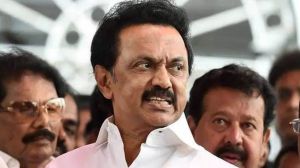Breakdown averted, breakthrough awaited
The first crisis in the peace process since the composite dialogue began last June has been averted by renewing reassurances that both sides...

The first crisis in the peace process since the composite dialogue began last June has been averted by renewing reassurances that both sides are committed to the political framework they had adopted in January and reaffirmed in September.
The good news from Pak Prime Minister Shaukat Aziz8217;s talks with the Indian leaders, including Prime Minister Manmohan Singh today, is the second round of the composite dialogue will now continue at a scorching pace in the next few weeks.
The bad news, however, is that India and Pakistan are yet to iron out the two hard wrinkles on the fabric of the peace process.
One is how to address the question of Jammu and Kashmir. The other is the relationship between progress on Jammu and Kashmir and the rest of the peace process.
On the first, India has apparently assured Aziz that there is no dilution in its commitment to sincerely explore all options for a negotiated settlement of Jammu-Kashmir.
| nbsp; |
Musharraf8217;s K-idea was only for debate at home: Aziz
|
||||
| nbsp; |
8226; Have come with no proposal; Kashmir idea, floated by Musharraf, meant for internal debate in Pak |
nbsp; | |||
There had been some concern in Pakistan that recent statements from India were signaling a lack of flexibility on the Kashmir negotiations.
Prime Minister Manmohan Singh8217;s message to Aziz was simple: What he had said in Srinagar was no different from the Indian positions he had conveyed to the President of Pakistan General Pervez Musharraf in New York on the margins of the United Nations General Assembly on September 24.
The thrust of the consistent Indian line is that it will not countenance another territorial partition of the country. And within that all-important benchmark, India would be prepared to explore creative options on Jammu-Kashmir.
Those reassurances look good enough for the second round of talks to proceed. But they might not have removed all the apprehensions in Pakistan that India has no radical solutions to offer on Kashmir.
The central obstacle to the Indo-Pak peace process seems to come from Musharraf8217;s expectations of an instant solution to the Kashmir question.
In most peace processes in the world, the difficult 8216;8216;final status8217;8217; issues are back-loaded8212;left towards the end of the process. Gen Musharraf, however, wants to front-load the most contentious issue8212;Jammu and Kashmir.
If Manmohan Singh can8217;t be rushed on J038;K, Shaukat Aziz insists that there can be no sustainable peace process without tangible progress on Kashmir.
The trick, then, for the two sides is to find progress 8216;8216;in tandem8217;8217; on both Kashmir and the rest of the relationship. The idea of simultaneous progress8212;even at different speeds8212;is in fact the political underpinning of the peace process.
It is in this context that the proposed bus services across the divide in Kashmir and the pipeline project come into focus.
India had proposed two bus services8212;between Srinagar and Muzaffarabad and Jammu and Sialkot. Pakistan has added another8212;between Poonch and Rawalkot. In both parts of J038;K, the proposals have fired the imagination of the people.
What holds back the bus services is procedure. An early agreement on travel documents8212;technical discussions will take place next month8212;could be the much-needed tonic for the Indo-Pak dialogue on Kashmir.
Finding a way to move forward on the pipeline project, which Pakistan has been promoting, while addressing at the same time India8217;s desire to send its goods via Pakistani territory to Afghanistan, Central Asia and the Persian Gulf would be equally important.
If Pakistan is ready to bring gas into India why can8217;t it accept transit trade from India in the other direction? Aziz says he is not averse to the idea, but says it must wait until there is greater trust.
Bus links across J038;K and the pipeline project are transformational projects. Making them happen would reduce the trust deficit and promote wider Indo-Pak integration that could embed a final settlement of Jammu and Kashmir.
- 01
- 02
- 03
- 04
- 05































